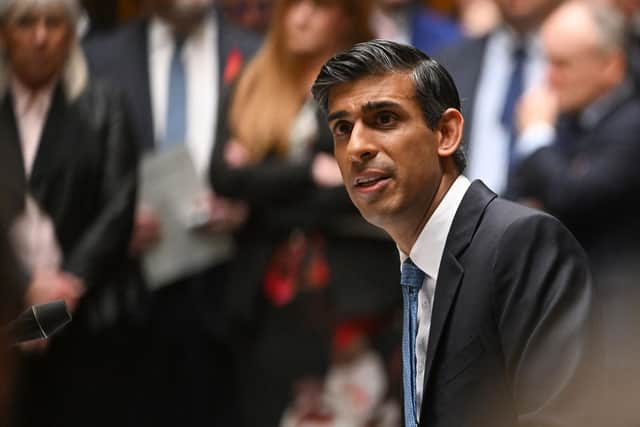How Russian delegates left the G20 meeting with a spring in their step - Patrick Mercer
Now, none of that happened with Russia’s President not even being present yet, some extraordinary things happened which may prove pivotal for this ghastly war.
The G20 was always going to be a stage for both sides of this conflict and without President Putin’s presence (possibly because the risks of assassination or humiliation were too high) many of the world’s key decision makers were together and ideally placed to be influenced.
Advertisement
Hide AdAdvertisement
Hide AdSo, having suffered losses on the ground, the Kremlin laid on a spectacular attack with drones and missiles against Ukrainian infrastructure to demonstrate exactly where they are dominating their enemy.


Then something unexpected happened. A missile plunged over the Polish border killing two farmers and immediately causing the world to ask whether Russia - by design or accident - had attacked a NATO country.
The media went barmy: the Third World War was imminent and this was stoked by President Zelensky bellowing to the assembled G20 that NATO should stand-to-arms, counter-attack and start a world wide conflagration.
Now wiser heads would have invoked the old maxim ‘never believe the first reports’. The missile proved to be Ukrainian, fired to intercept incoming Russian ones: it missed and what goes up must come down, killing Polish civilians.
Advertisement
Hide AdAdvertisement
Hide AdWild theories about the firing point of the weapon followed, but the head of NATO quickly ruled that Kiev’s forces had fired it, albeit in response to Moscow’s attack.
Now, the G20 was holding its collective breath when President Zelensky made his most serious mistake of the war so far by insisting - despite expert evidence - that it was "not our missile or our missile strike".
Remember, the world was listening and this was what one diplomat from a NATO country told the Financial Times: "This is getting ridiculous. The Ukrainians are destroying [our] confidence in them. Nobody is blaming Ukraine and they are openly lying. This is more destructive than the missile."
I have no doubt that Ukrainian intelligence had predicted that there would be a missile storm or some other demonstration of Russian might at some time during the G20 meeting.
Advertisement
Hide AdAdvertisement
Hide AdI have no doubt that the Ukrainian staff had war-gamed all sorts of eventualities and carefully briefed their boss on how he should react; and I have no doubt that he got it dead wrong.
President Zelensky’s misjudgment lost much sympathy and exasperated his audience at a stroke and, what’s worse, he did it whilst all the key folk were together and could discuss it face to face.
Then a worse mistake followed. For a few hours after the missile strike - whilst contradictions swirled and nothing was certain - there was the opportunity for the USA and the other NATO countries to present a unified front, to back Ukraine’s assumptions and to pitch in right behind Kiev and injured Warsaw.
It wouldn’t have mattered if later reports showed that NATO had over-reacted: Russia would have seen an implacable response.
Advertisement
Hide AdAdvertisement
Hide AdBut what did we get? Nothing but talk. The beauty of all the premiers being together was that rapid and firm leadership could have slapped Russia in the face, yet the members’ vacillation gave Moscow a repeat of President Obama’s shameful climb down in Syria in August 2012.
So what does this mean? Well, unless everyone comes to their senses, a direct confrontation between NATO and Russia is inevitable.
Kiev is increasingly dependent on NATO weapon supplies whilst the Russian air marshals and admirals are desperate to interdict them before they disperse once on Ukrainian soil.
Suppose, therefore, that a convoy of lethal supplies were to be sunk in international waters and suppose that the projectiles that hit them were Western weapons of a type that had been supplied to Ukraine but which, like so many others, had fallen into the wrong hands.
Advertisement
Hide AdAdvertisement
Hide AdWhat would NATO do? The recriminations would be endless: the uproar would be vast and predictable and I suspect that, based on what’s just happened in Poland, Russia would gamble that NATO’s reaction would be as feeble as it was last week.
Think about this, At the G20 Mr Sunak pledged his support to Ukraine in ringing tones shortly before he made a lighting visit to rocket wracked Kiev. Similarly, he didn’t demure about the prominent role that Washington has been graciously pleased to hand to Britain in Ukraine whilst even a casual observer will notice that our army has officially been ‘mobilised for war’.
Yet, this is the same Mr Sunak who has rowed back from an increase in defence spending and allowed the cut of 10,000 soldiers to proceed.
He also approved the halving of our garrison in Estonia right slap bang on Russia’s border and ordered our troops in Mali to withdraw in line with our close ally France rather than confront Russian mercenaries.
Advertisement
Hide AdAdvertisement
Hide AdImpressive, isn’t it? The Western allies have failed a sudden test of their resolve, Westminster’s noisy jingoism has proved to be as hollow as our defence budget.
I suspect that Russia sent its delegates to Bali with a bit of a limp, but they left with a real spring in their step.
Patrick Mercer is a former MP for Newark and Army colonel.